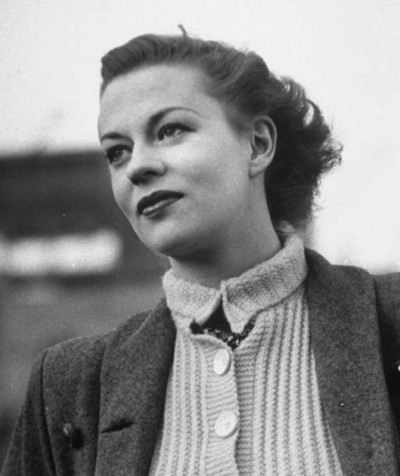Uta Hagen (Uta Thyra Hagen)

Born in Göttingen, Germany, the daughter of Thyra A. (née Leisner) and Oskar Frank Leonard Hagen, Hagen and her family emigrated to the United States in 1924, when her father received a position at Cornell University. She was raised in Madison, Wisconsin. She appeared in productions of the University of Wisconsin High School and in summer stock productions of the Wisconsin Players. She studied acting briefly at the Royal Academy of Dramatic Art in 1936. After spending one semester at the University of Wisconsin, where her father was the head of the department of art history, she left for New York City in 1937. Her first professional role was as Ophelia opposite Eva Le Gallienne in the title role of Hamlet in Dennis, Massachusetts in 1937.
Hagen was cast, early on, as Ophelia by the actress-manager Eva Le Gallienne. From there, Hagen went on to play the leading ingenue role of Nina in a Broadway production of Anton Chekhov’s The Seagull which featured Alfred Lunt and Lynn Fontanne. It was 1938; Hagen was just 18. This experience left an indelible mark on the young actress, as she later reflected, “My next job was Nina in The Seagull, [her Broadway bow] with the Lunts, on Broadway. That sounds incredible, too. They were an enormous influence on my life.” She admired “their passion for the theatre, and their discipline. It was a 24-hour-a-day affair, and I never forgot it—never!” The New York Times’ critic Brooks Atkinson hailed her Nina as “grace and aspiration incarnate”.
She played George Bernard Shaw’s Saint Joan (1951) on Broadway, and Desdemona in a production which toured and played Broadway, featuring Paul Robeson as Shakespeare’s Othello and her then-husband Jose Ferrer as Iago. She took over the role of Blanche DuBois in A Streetcar Named Desire for the national tour, which was directed not by Elia Kazan who had directed the Broadway production but by Harold Clurman. Hagen had had a revelatory experience when she first worked with Clurman in 1947. In Respect for Acting, she credited her discoveries with Clurman as the springboard for what she would later explore with her husband Herbert Berghof: “how to find a true technique of acting, how to make a character flow through me”. She played Blanche (on the road and on Broadway) opposite at least four different Stanley Kowalskis, including Anthony Quinn and Marlon Brando. Through interviews with her and contemporary criticism, the report is that Hagen’s Blanche refocused the audience’s sympathies with Blanche rather than with Stanley (where the Brando/Kazan production had leaned). Primarily noted for stage roles, Hagen won her first Tony Award in 1951 for her performance as the self-sacrificing wife Georgie in Clifford Odets’ The Country Girl. She won again in 1963 for originating the role of the “I-wear-the-pants-in-this-family-because-somebody’s-got-to” Martha in Edward Albee’s Who’s Afraid of Virginia Woolf?. (An original cast recording was made of this show.) In 1981 she was elected to the American Theatre Hall of Fame and in 1999 received a “Special Lifetime Achievement Tony Award”.
Hagen considered the period between 1938 and 1947 as “the transitional years of my career, during which I lost my way and a love of acting until I finally regained it to begin a true life in the theater.” Although she appeared in some movies, because of the Hollywood blacklist she had more limited output in film and on television, not making her cinematic debut until 1972. She would later comment about being blacklisted, “that fact kept me pure”. She was nominated for a Daytime Emmy Award as “Outstanding Supporting Actress in a Drama Series” for her performance on the television soap opera One Life to Live.
She taught at HB Studio, a well-known New York City acting school on a cobblestone, tree-shaded street in the West Village. She began there in 1947, and married its co-founder, Herbert Berghof, on January 25, 1957. Later in her life, Hagen undertook a return to the stage, earning accolades for leading roles in Mrs. Warren’s Profession (1985), Collected Stories, and Mrs. Klein. After Berghof’s death in 1990 she became the school’s chairperson. Hagen was an influential acting teacher who taught, among others, Matthew Broderick, Christine Lahti, Amanda Peet, Jason Robards, Sigourney Weaver, Katie Finneran, Liza Minnelli, Whoopi Goldberg, Jack Lemmon, Charles Nelson Reilly, Manu Tupou, Debbie Allen, Herschel Savage, Jon Stewart, and Al Pacino. She was a voice coach to Judy Garland, teaching a German accent, for the picture Judgment at Nuremberg. Garland’s performance earned her an Academy Award nomination.
Respect for Acting is used as a textbook for many college acting classes. She also wrote a 1976 cookbook, Love for Cooking. In 2002, she was awarded the National Medal of the Arts by President George W. Bush at a ceremony held at the White House. In 2001, Hagen released a video entitled Uta Hagen’s Acting Class, a two-part set that captures her master classes. Harvey Korman talks about studying under her during his Archive of American Television interview in 2004. David Hyde Pierce worked with Hagen in the Richard Alfieri play “Six dance lessons in six weeks”, at the Geffen Playhouse in 2001. Hyde Pierce spoke at her 2004 memorial at Manhattan’s Majestic Theater.
Born
- June, 12, 1919
- Göttingen, Germany
Died
- January, 14, 2004
- USA
- New York, New York
Other
- Cremated

